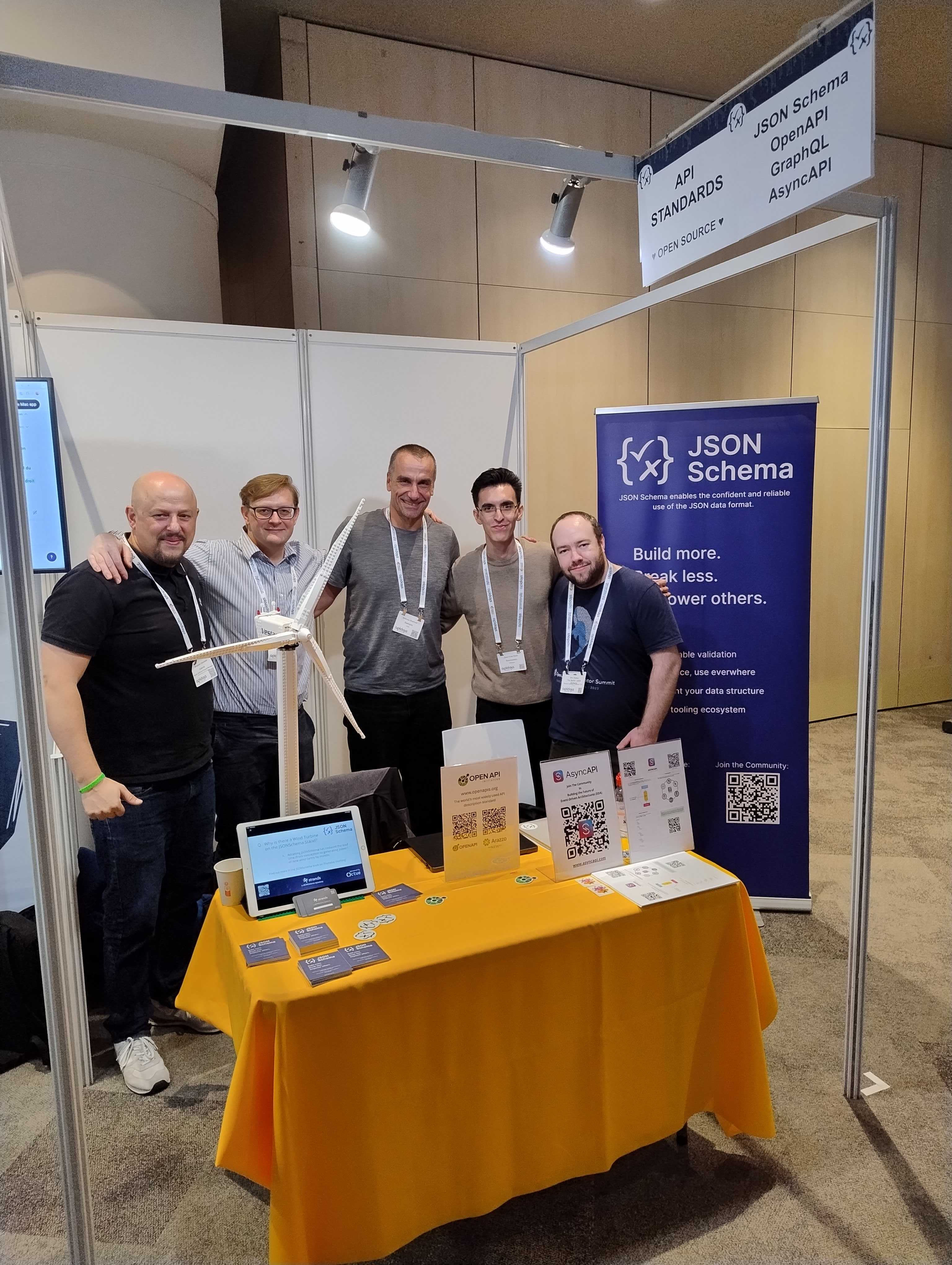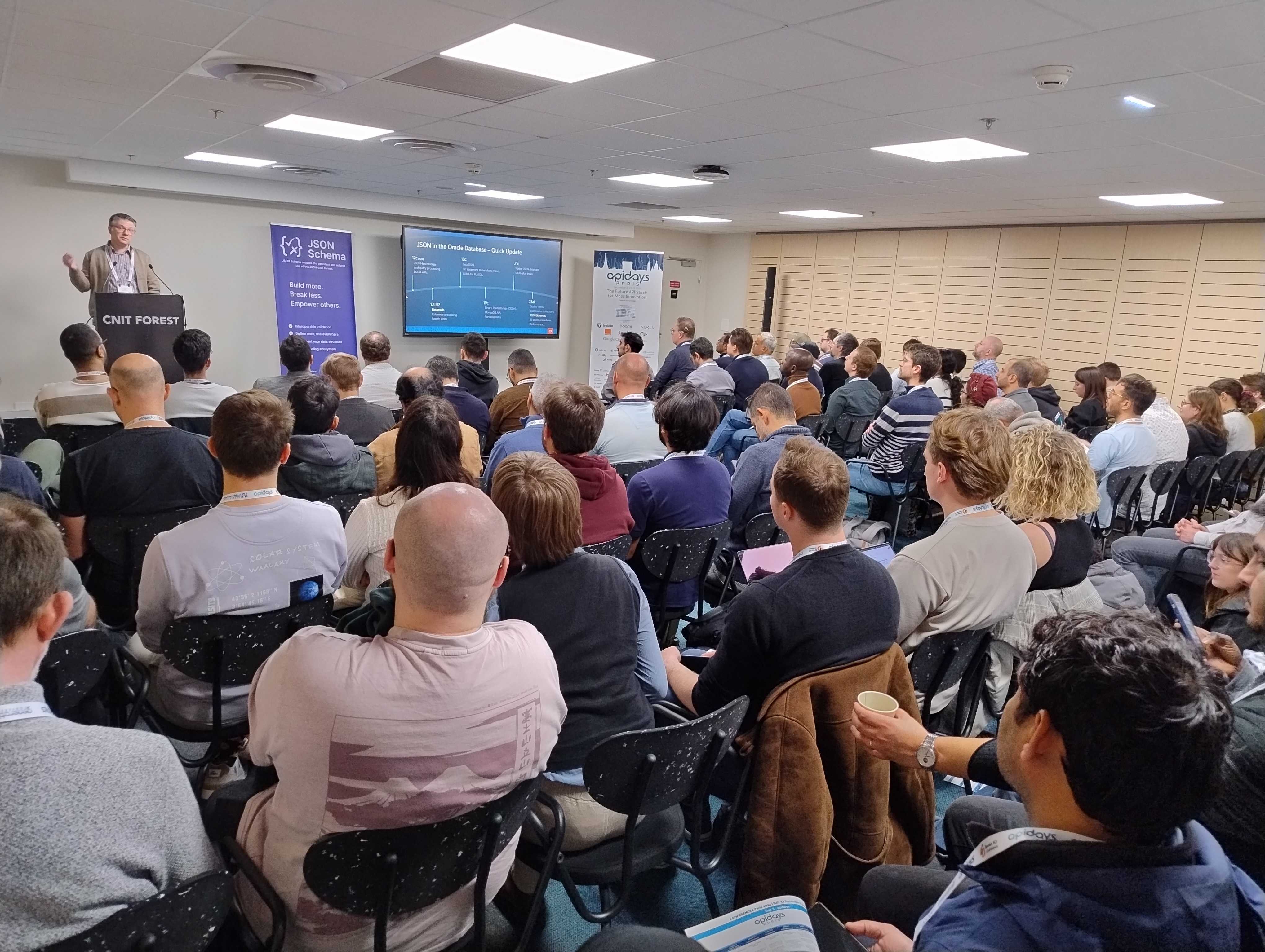JSON Schema conference: A milestone event at Apidays Paris 2024
Introduction
Apidays Paris, the flagship event of the apidays family, returned this year with a focus on "The Future API Stack for Mass Innovation." This annual gathering of API enthusiasts, developers, and industry leaders brought together experts to discuss the latest trends and best practices in API design, API development, and API management.
This year's agenda highlighted the increasing role of AI in API development, exploring how AI can be used to automate tasks, improve API design, and enhance API performance. Continuing our successful partnership with AsyncAPI and OpenAPI, this year's event marked a significant milestone with the inaugural JSON Schema conference track. This dedicated track, sponsored by Octue, delved deep into the world of JSON Schema, exploring its role in API design, validation, and documentation.
The first JSON Schema conference
The inaugural JSON Schema conference track at apidays Paris 2024 was a resounding success. As part of the larger conference theme "The Future API Stack for Mass Innovation," the track showcased JSON Schema's crucial role in modern API development and data contract design.

Ten comprehensive presentations spanned the spectrum of JSON Schema applications, from foundational concepts to cutting-edge implementations. The list of talks included:
- JSON Schema for data design and contract, client and code generation by Tom Collins (DVLA, UK Gov)
- IEC standards: Toward digital standards with JSON Schema by Thomas Clark (Octue CEO, conference sponsor)
- Introducing Strands - a JSON Schema repository by Thomas Clark
- JSON Schema: powering FINOS architecture as code by James Gough (Morgan Stanley)
- Generic and extensible web of things manager using JSON Schema and AI by Andreas Eberhart (Dashjoin, JSON Schema ambassador)
- High-performance JSON Schema validation in .NET by Matthew Adams (Endjin, TSC member)
- JSON schema and relational databases: bridging the gap by Loic Lefèvre (Oracle)
- Applying software engineering practices to JSON Schemas by Juan Cruz Viotti (Sourcemeta CEO, TSC member)
- The state of JSON schema by Benjamin Granados (Celonis, TSC member)
- Unlocking dynamic frontend development through JSON Schema by Neha Singla (Apple)
Three major themes recurred throughout the track: data design and standardization, tooling infrastructure, and modern application integration. Particularly notable was the emphasis on JSON Schema's role in AI integration and automated API development, aligning perfectly with the broader conference focus on AI's increasing importance in the API landscape.
Octue's sponsorship significantly bolstered the track's success, demonstrating their commitment to the JSON Schema community. This support enabled a diverse range of speakers to share their expertise and experiences.
Audience engagement exceeded expectations. Attendees from various industries and organizations - such as fintech, renewable energy, IT, and government - participated in robust Q&A sessions after each presentation. The discussions revealed both the growing adoption of JSON Schema across different sectors and the community's hunger for more knowledge about its practical applications.

Looking ahead, this first dedicated track has laid a strong foundation for future JSON Schema events. The feedback highlighted the need to further showcase JSON Schema's versatility across different use cases, and plans are underway to expand and enhance next year's track. This successful launch not only validates JSON Schema's importance in modern API development but also signals the beginning of a new chapter in the community's growth and evolution.
Collaboration with organizations
The success of the JSON Schema track at apidays Paris 2024 highlighted the vital role of community collaboration in our growth. It also demonstrated how organizations collaborating with JSON Schema gain more than just visibility - they become part of a broader movement toward standardized, high-quality API development.
Here's how your organization can benefit:
- Standardization & interoperability: Ensure seamless data exchange and API integration.
- Improved data quality: Minimize errors with robust data validation.
- Enhanced API design: Streamline development with clear and concise schemas.
Increased productivity: Automate tasks and boost efficiency with JSON Schema tools.
Here’s how you can become part of the initiative:
- Be an ambassador: Share your JSON Schema expertise and champion its adoption.
- Become a sponsor: Gain visibility and support the standard's growth.
- Contribute to the project: Help us shape the future of JSON Schema development.
- Join our Slack workspace: Connect with the vibrant JSON Schema community.
Together, we can build a more robust and interoperable API ecosystem.
A final thank you to Octue for sponsoring the conference, apidays Paris for hosting it, the organizers for their dedication and hard work, and the attendees for your valuable input and insightful questions. On behalf of JSON Schema, we look forward to seeing you again next year!
Acknowledgments: The author would like to thank Onyedikachi Hope, Ben Hutton, and Benjamin Granados for their valuable feedback, which enhanced the quality of this article.
